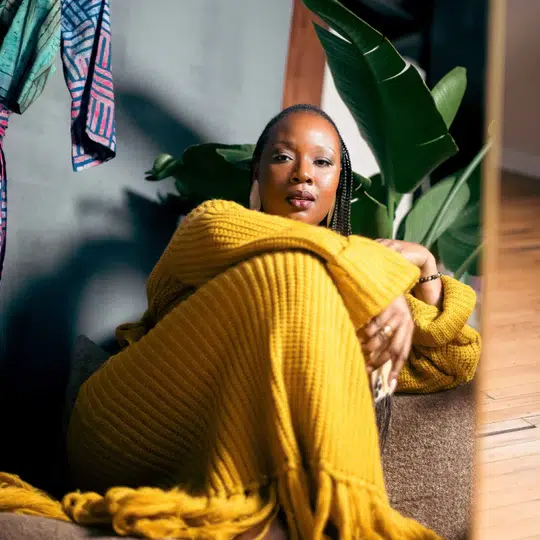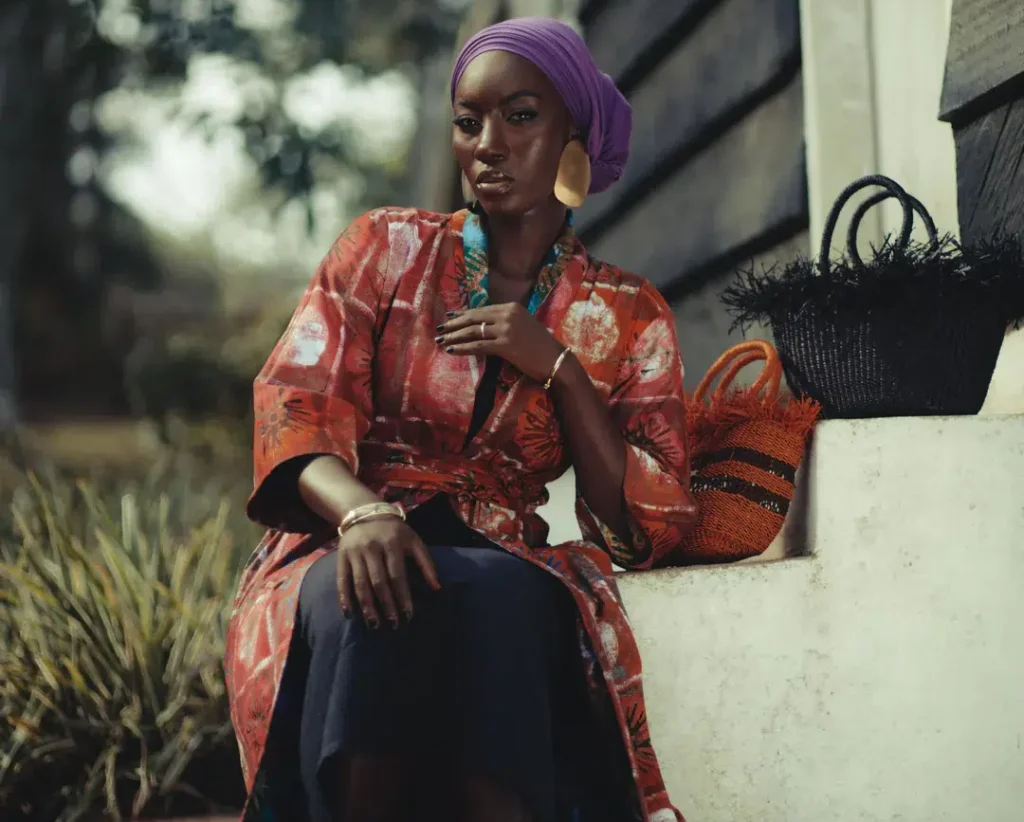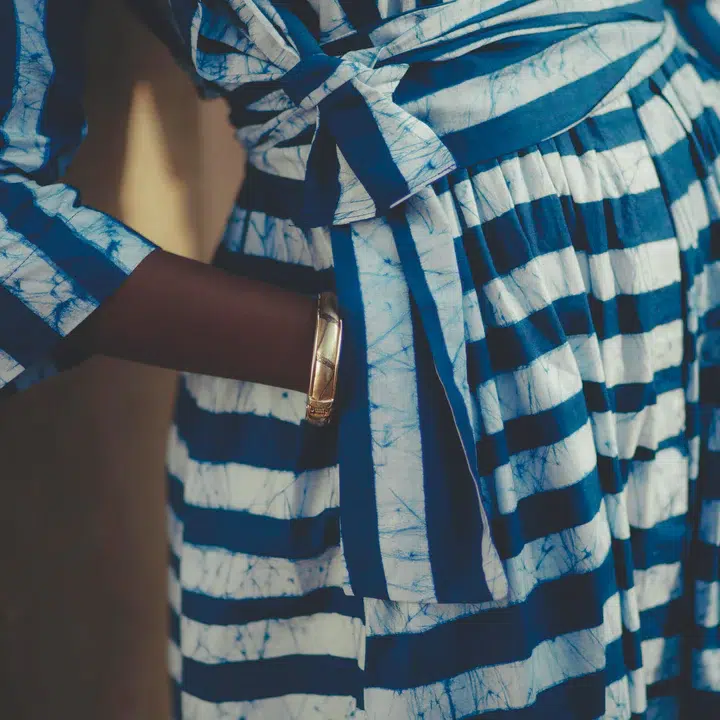LOVE DOT: A fashion brand that celebrates its roots with bold style

LOVE DOT is more than just a clothing line – it is a living work that celebrates the power and heritage of the African diaspora. Founded by Nneka Ude, a designer and storyteller, LOVE DOT weaves a story through its clothing and accessories that honors these roots.
With roots in Nigeria and the Southern United States, Ude brings a deep respect for tradition to her designs, creating bold, sophisticated pieces that blend her distinct identities.
Join us as we explore how LOVE DOT connects culture, fashion and social impact.

What What inspired you to found LOVE DOT?
I started LOVE DOT to pay tribute to my roots. The name itself is a tribute to my late mother Dorothy Dudley, who was affectionately known as “Dot”.
She is the inspiration that fuels my desire to build a brand that centers and celebrates the power of the African diaspora. LOVE DOT is truly a representation of myself, my background and my family history. My roots span Nigeria and the American South. I have always been passionate about finding ways to connect the dots of my various identities in the diaspora.
Fashion and design was an obvious way to achieve this. I’m not a trained designer, but I’ve always had an eye for beautiful textiles and unique designs that make a statement without much effort. As someone who is constantly on the move, I realized the importance of creating pieces that are bold and easy to wear, but also timeless.
Our prints tell a story. They are bold, unexpected and aspirational. My goal is to create clothing and jewelry that inspire people to move with a higher level of elegance and confidence everywhere – from social gatherings to corporate events.
How did you originally finance the founding of your company?
I’m a hybrid entrepreneur. By day, I’m a senior strategy director for one of the largest shopper marketing and creative commerce agencies in the U.S. By night, and every other free hour of my day, I’m the CEO and Creative Director of LOVE DOT. To get the company off the ground, I relied on my company salary and eventually business loans.
How do you balance social impact with building a profitable business?
I am convinced that economic development and cooperation within the diaspora is the most important form of social impact in building Africa.
I want to work directly with established small businesses in West and Southern Africa that have long been a mainstay of economic support and development in their local communities. I want LOVE DOT’s growth to be reciprocal – a reinvestment in other black and African businesses in the diaspora. Our partners employ trained and skilled workers at above market wages and often provide them with food and accommodation.
Our items are priced comparably to other affordable luxury brands, allowing us to continue to focus on people AND profit. Too many people see Africa as the land of the exploited, a place where everyone’s skilled labor can be used by others at the lowest possible cost; which sets the bar low for what people are willing to pay for a quality final product.
From an environmental perspective, we are equally committed to adapting our production to demand. Our batik fabrics are made in-house using textiles (cotton) from Togo and Benin. Each collection is produced in limited quantities in batches, with surplus fabrics used to make other items such as purses, scarves and headscarves.
We have restricted production to limit waste and better control our margins. But we are also restricting production to break a vicious circle. An article by Bárbara Poerner for Fashion Revolution entitled “Where do the clothes end up? Modern colonialism disguised as a donation” shows that 70% of donated clothes end up back in Africa as garbage or second-hand sales. By limiting waste and maintaining high standards, we avoid contributing to this problem.
Fashion is the biggest form of waste. Africa has become the world’s dumping ground for second-hand goods. Our goal is to ensure we do not contribute to this problem.
Can you explain in more detail the selection process that led to your partnerships in Ghana and South Africa?
We found our manufacturing partners through networking at retail trade shows and exhibitions around the world. Often times, a country’s economic development commissions will bring a group of vetted and established small businesses to exhibit at these events.
This is a way for governments to encourage the development of small businesses in a specific industry. I have used these events to find potential partners that fit our mission and meet our specific partner requirements.
How do you ensure that traditional techniques are preserved while collaborating on contemporary designs?
The tradition is in the fabric. Our batik fabrics are handmade using traditional techniques. Batik is a beautiful embossing process that involves applying wax to cotton and requires an enormous amount of skill and knowledge.
This process has been practiced for centuries in West Africa and Southeast Asia and has been perfected by our team and partners over decades. We make no compromises or deviate from the process, which takes time and nature to perfect.
Then we take each bundle of fabric and transform it into clothing that the modern woman or man pursuing their dreams can wear with the utmost confidence and pride.
If you could wake up tomorrow as an expert in any business skill, what would it be?
This question may be the most difficult of all to answer.
I come from a business background and am therefore involved in the areas of order, processing and structuring – both of which are often lacking when doing business abroad.
I think the three business skills I could give a TedTalk about in the last three years would be adaptability, problem-solving skills, and the power of emotional intelligence.
Starting a business is not easy. However, doing business anywhere on the continent is not for the faint of heart. Things are different. The way business is done is different. You have to learn to adapt quickly.
You have to learn to quickly recognize what is happening around you, in cultures that are foreign to you. You have to learn to figure things out to make them work – which sometimes requires deliberate planning and sometimes strong personal relationships in the country.
Where do you see your company in the next 5 years?
In five years, LOVE DOT will be a brand that is not only sold through our own online retail channels, but will also be available at major retailers such as Wolf & Badger, Nordstroms and Anthropologie.
Our production will not only extend to South Africa and Ghana, but will again be rooted in Nigeria and include other traditionally woven fabrics – such as Akwete.
The original designs that started LOVE DOT were manufactured in Nigeria, however in recent years we have scaled back production due to rising business costs.
The complete collection can be found at www.LOVEDOT.co
Press, business and wholesale inquiries:
Nneka Ude – [email protected]
Customer service – [email protected]





